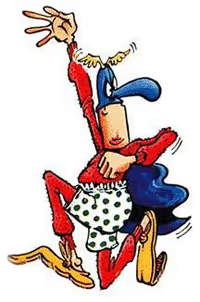Which Wild Party is better?
#25Which Wild Party is better?
Posted: 10/8/13 at 10:37am
For me, the Lippa score is superior, hands down. To me, it reflects the tone of the poem much more than LaChiusa’s.
I am a fan of LaChiusa, but he has such a specific style that I feel (in most cases) he only alters to fit the musical’s needs/tone a small bit. Therefore, for me, LaChiusa’s scores only work for shows that fit his style of music in the first place. I find myself occasionally thinking that some of his scores are beautiful, but do nothing for the musical at hand. “Wild Party” is one of those cases.
#26Which Wild Party is better?
Posted: 10/8/13 at 10:40amEven though I'm partial to Lippa's, People Like Us from LaChiusa's is an undeniably great song.
#27Which Wild Party is better?
Posted: 10/8/13 at 10:50am
That's interesting, GilmoreGirlO2, because I think LaChiusa is as much a stylistic chameleon as Sondheim. I don't think there is a LaChiusa "style." To me, the gulfs between MARIE CHRISTINE and GIANT and THE WILD PARTY and QUEEN OF THE MIST are enormous.
I also feel so strongly about LaChiusa’s score being infinitely superior to Lippa’s that I question the judgment of anyone who disagrees.
I guess I’m a little After Eightish in that way on this particular question.
#28Which Wild Party is better?
Posted: 10/8/13 at 11:02amI agree that the shows are about unlikable people behaving reprehensibly, and that will always be a hurdle to clear. But Wolfe's production was dazzlingly theatrical, the cast was astonishing and the jagged, jazz-inflected score by LaChiusa made for an unforgettable evening in the theater.
#29Which Wild Party is better?
Posted: 10/8/13 at 11:14amLa Chiusa's is better, but I don't think either of them got the bleak, spare feeling of the poem, which is probably unadaptable to musical theater, period.
#30Which Wild Party is better?
Posted: 10/8/13 at 11:20am
^ I agree with that, but at least LaChiusa was on the right track.
#31Which Wild Party is better?
Posted: 10/8/13 at 11:28am^ And I agree with both of you. But I think, as its own thing, LaChiusa's is a vibrant, heart-racing work that has stayed with me for nearly a decade and a half.
#32Which Wild Party is better?
Posted: 10/8/13 at 11:45am
Mysteriousgrowl, I feel like I can spot a LaChiusa score the second I hear it (the occasionally disjointed notes, the type of instruments always used, etc.).“Giant” is perhaps one of the musicals where I feel like he strayed the most from his usual and served the musical before his own musical stylings (and that, I think, is because he had such a concrete feel/style of the western setting to be able to play off of).
Also, I want to note that I don’t think it’s a bad thing for a composer to have a specific style or for the listener be able to immediately recognize who wrote the music (I would say the same thing of Sondheim’s scores). However, what I think Sondheim is able to achieve that LaChiusa (most of the time) does not is the ability to adapt the style to serve the particular show/moment in the show. Occasionally when I hear a LaChiusa score, there are certain aspects of the music that feel out of place within the musical itself and, generally, those are the things that are inherently LaChiusa.
Now, on the other hand, sometimes these musical elements that feel “specifically LaChiusa” to me work wonderfully for the musical itself. It’s not that I dislike the actual music for “Wild Party,” it just doesn’t feel like the right fit for the story, for me.
To each his own, though!
#33Which Wild Party is better?
Posted: 10/8/13 at 12:06pmI personally hated both scores but Lippa's at least contains a few gems ("Life of the Party," "Old Fashioned Love Affair").
#34Which Wild Party is better?
Posted: 10/8/13 at 12:41pm
I also find LaChiusa's work to be singular.
What's odd is that despite having a distinctive style (to my ears at least) I love some of his shows and detest others.
#35Which Wild Party is better?
Posted: 10/8/13 at 3:55pm
I generally like LaChiusa (most of the time) but I very much prefer Lippa's score. Note, I am basing this only from hearing both scores, so perhaps seeing the actual shows would change my opinion.
nasty_khakis
Broadway Legend Joined: 3/15/07
#36Which Wild Party is better?
Posted: 10/8/13 at 4:14pmI fall in line very much with growl. I question the taste and opinion of anyone who says Lippa's score is superior. You can like the songs as songs more, sure. Lippa wrote disjointed, non-cohesive pop songs, all very catchy and enjoyable. LaChuisa wrote a score, and a magnificent one at that. It is dynamic and bold and heart-breaking. His show was about an overall theme, racism and classism and each characters response. Lippa's truly is a each character comes, sings their piece, then leaves, no matter how high Idina and Julia belted, there is almost zero character development.
#37Which Wild Party is better?
Posted: 10/8/13 at 6:06pmLaChiusa's score felt like it was composed with the story and period in mind. Lippa's score, like nearly all his scores, sounds like generic trunk songs. Some of which are okay and I could possibly understand preferring them if you'd never heard LaChiusa's complex and sophisticated work. Lippa's may be "musical theatre" in its basest form, but LaChiusa's score is truly a work of art. The uneasy tension and sense of danger are ever-present even spiraling to heart-racing heights of anxiety. Sex, seduction, passion, lust, frivolity, obsession, envy, anger, depression, excess and revenge are all masterfully detailed and profoundly resonant. Lippa's score by comparison is reminiscent of an abridged picture book.
#38Which Wild Party is better?
Posted: 10/8/13 at 6:26pmHas anyone ever seen the James Coco/Raquel Welch film? I didn't really care for that. Never read the poem though.
kurt.perry41
Stand-by Joined: 11/20/11
#39Which Wild Party is better?
Posted: 10/8/13 at 6:48pmHere's the thing about this pair, I fundamentally think that as a performer, Lippa's is far more rewarding to perform. Also if you compare song to song, I believe Lippa wipes the floor with LaChiusa. However, that being said, if the scores go head to head as a whole, LaChiusa comes out of top. LaChuisa woret a bigger show that Lippa did, Lippa focused on the interpersonal relationships of Kate, Burrs, Queenie and Black, while LaChiusa had more to say about the society in which the characters inhabit. I personally believe that Lippa is a superior songwriter while LaChiusa writes a more immersive score.
Pawnee Bill
Swing Joined: 10/13/13
#40Which Wild Party is better?
Posted: 10/14/13 at 2:50amI liked them both, but it must be said that the Lippa version played in a single set in an off-Broadway environment while the LaChiusa was a full-fledged Broadway show using a turntable to rove cinematically through the story's "places." That in itself made it a more interesting production. Both albums are well worth hearing now that the shows themselves have closed, and you can even hear LaChiusa's director, George Wolfe, on the CD shouting, "Will everyone please go home?" The line was invented for the recording.
Videos









